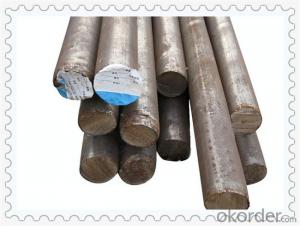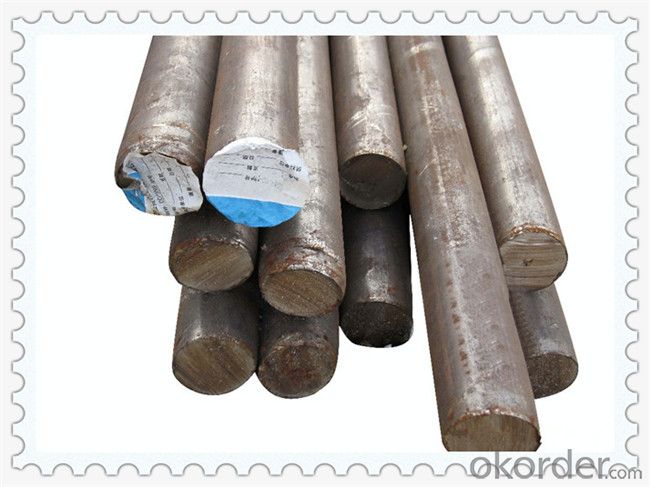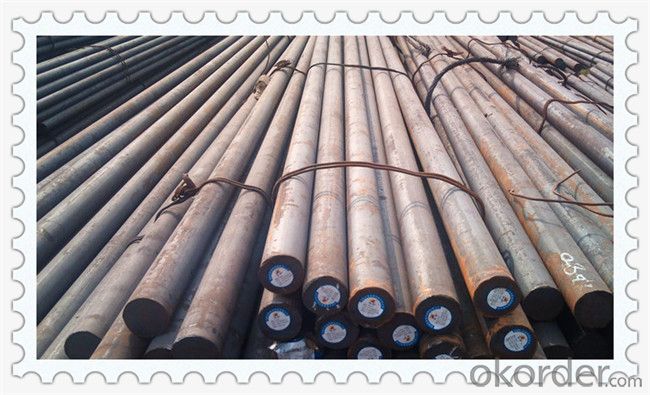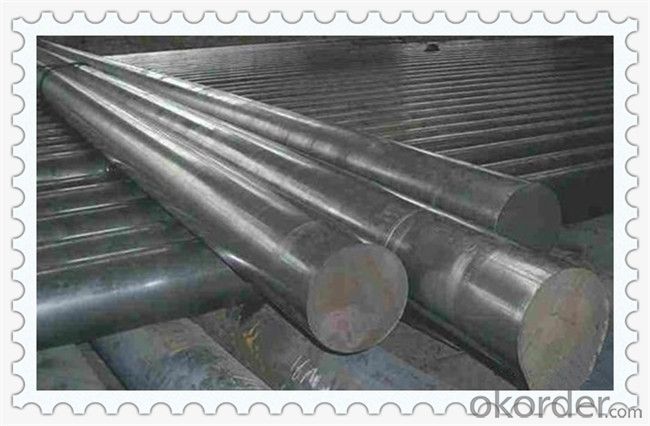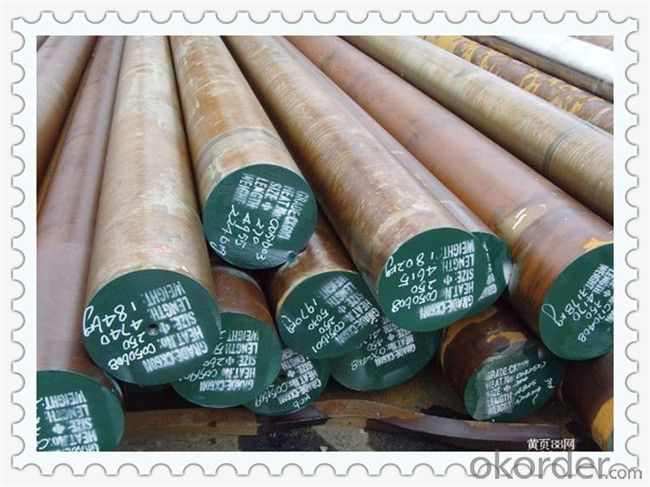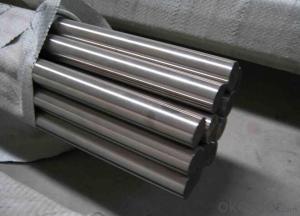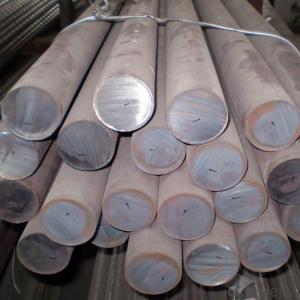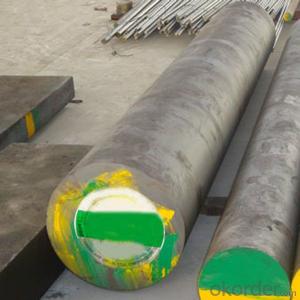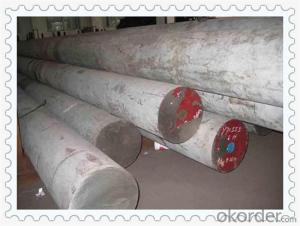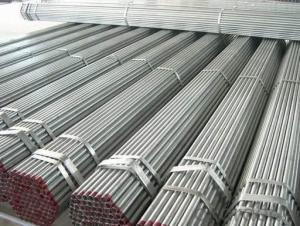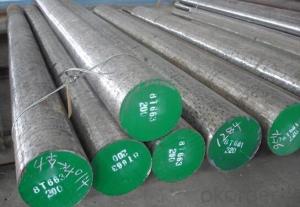42CrNiMo4 Alloy Structural Steel Round Bars
- Loading Port:
- China main port
- Payment Terms:
- TT or LC
- Min Order Qty:
- 30 m.t.
- Supply Capability:
- 10000 m.t./month
OKorder Service Pledge
OKorder Financial Service
You Might Also Like
42CrNiMo4 Alloy Structural Steel Round Bars
Product Details
Carbon Steel Round Bar | SS400, S235JR,Q235, ASTM A36, Fe360A, Fe360B,SM400A,080A15, SS41,E235B |
SAE 1020, AISI 1020, ASTM 1020, S20C, 20#, 050A20 | |
SAE 1045, AISI 1045, ASTM 1045, S45C, 45#,EN8, XC45, XC48, 45B, C45, CK45, CM45, 060A47, R683/IC45e | |
Alloy Steel Round Bar | 40Cr, DIN 1.7035, SAE 5140, AISI 5140, ASTM 5140, SCr440, 41Cr4, 530A40, 42Cr4, 40X, R683/VII3 |
SAE4140,42CrMo, 42CrMo4, DIN 1.7225, SCM440,EN19, 42CD4, 708M40, R683/II3 | |
SAE 4340, 40CrNiMoA, EN24, SNCM439, 817M40,40XMA, R683/III4 | |
SAE 8620,,AISI 8620, ASTM 8620, 20CrNiMo,SNCM220, 805M20 | |
SAE52100, AISI52100,ASTM E52100, GCr15, SUJ2, 100C6, 100Cr6, 1.3505, 534A99, IIIX15 |
Chemical composition
| Standard | Grade | C | Cr | Mo | Si | Mn | P | S | Ni | Cu |
| GB | 42CrMo | 0.38-0.45 | 0.90-1.20 | 0.15-0.25 | 0.17-0.37 | 0.50-0.80 | 0.035 | 0.035 | 0.3 | 0.3 |
| JIS | SCM440 | 0.38-0.43 | 0.90-1.20 | 0.15-0.30 | 0.15-0.35 | 0.60-0.90 | 0.03 | 0.03 | 0.25 | 0.3 |
| ASTM | 4140 | 0.38-0.43 | 0.80-1.10 | 0.15-0.25 | 0.15-0.35 | 0.75-1.00 | 0.035 | 0.04 | — | — |
| ENISO | 42CrMo4 | 0.38-0.45 | 0.90-1.20 | 0.15-0.30 | ≤0.40 | 0.60-0.90 | 0.035 | 0.035 | — | — |
Mechanical Properties
| Grade | Tensile Strength (Mpa) | Yield Strength (Mpa) | Elongation (%) | Reduction of Area (%) | Charpy Impact (J) |
| 42CrMo | ≥1080 | ≥930 | ≥12 | ≥45 | ≥63 |
Products Show
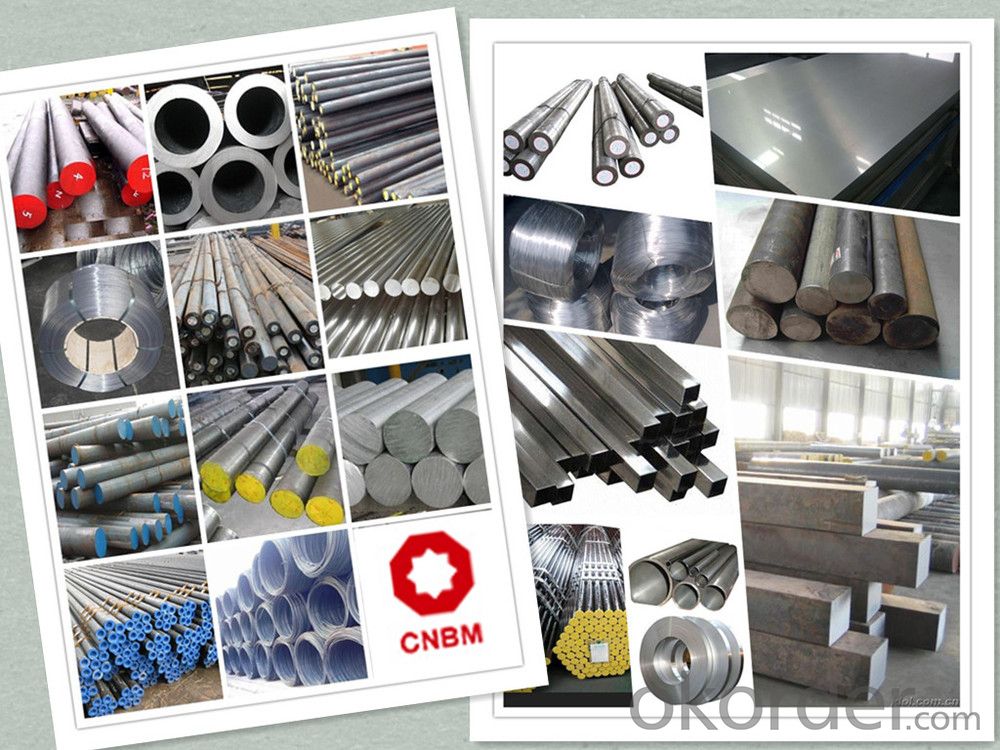
Product Overviews
| Product Name | Typical Grades | Diameter(mm) | Standard adopted |
| Carbon Steel | 20 (1020/S20C/C22) | Ø16-Ø300 |
GB/SAE/JIS/DIN
|
| 40 (1040/S40C/C40) | |||
| 45 (1045/S45C/C45) | |||
| Bearing Steel | GCr9 (51100/SUJ1) | Ø12-Ø250 | |
| GCr15 (52100/SUJ2/100Gr6) | |||
| GCr9SiMn (A485-Gr.1/SUJ3) | |||
Cr-Mo Steel | 20Cr (5120/SCr420H/20Cr4) | Ø12-Ø250 | |
| 40Cr (5140/SCr440/41Cr4) | |||
| 42CrMo(4140/SCM440/42CrMo4) | |||
| Gear Steel | 20CrNiMo | Ø16-Ø600 | |
| 20CrMn(5115/SMnC420/20MnCr5) | |||
| 20CrNiMo(8620/SNCM220/20CrMiMo2) |
Application
| Carbon Steel | Mold bottom, Plastic mold, Construction machinery parts Automobile parts, Security grills, Screens, Construction |
| Bearing Steel | Aerospace, Navigation, Nuclear energy, Chemical industry Electronic information, Petrochemical, Instrument and meter Transportation |
| Cr-Mo Steel | Mechanism & Fasteners gear, Stressed components for vehicles Engines and machines, Parts of larger cross-section |
| Gear Steel | All kinds of gears, Statically and dynamically stressed component for vehicles Engines and machine, Larger cross-section parts, Crankshafts |
Work Shop
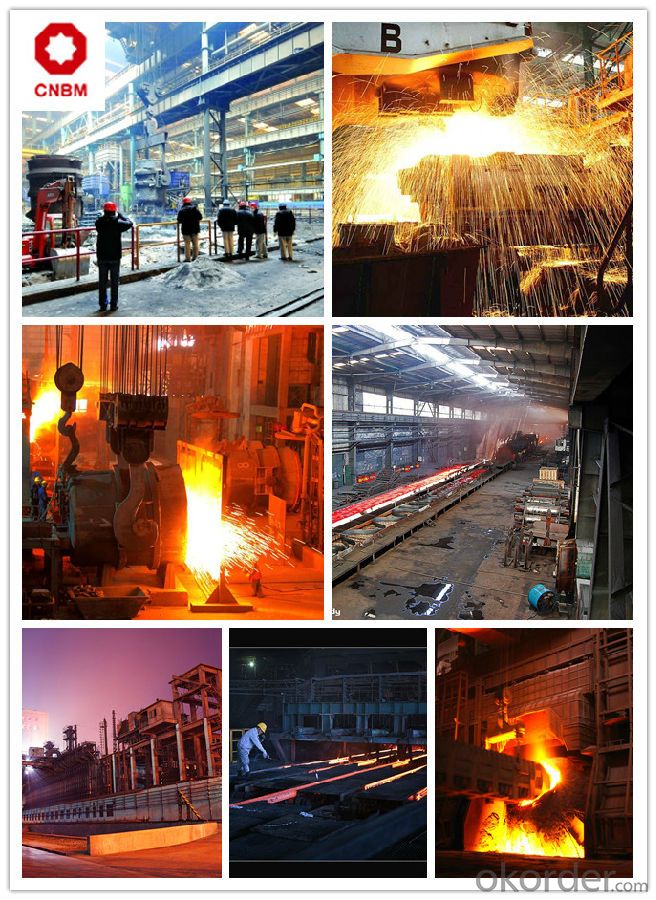
Company Information
CNBM International Corporation is the most important trading platform of CNBM group.
Whith its advantages, CNBM International are mainly concentrate on Cement, Glass, Iron and Steel, Ceramics industries and devotes herself for supplying high qulity series of refractories as well as technical consultancies and logistics solutions.

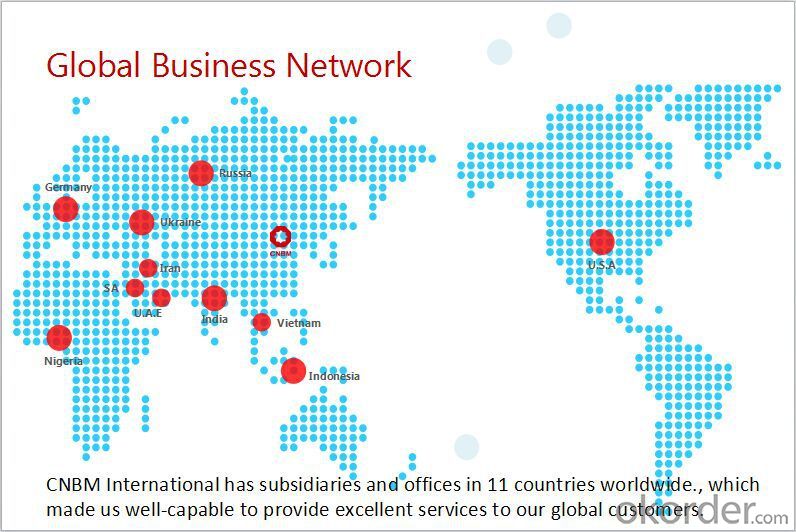
FAQ
1, Your advantages?
professional products inquiry, products knowledge train (for agents), smooth goods delivery, excellent customer solution proposale
2, Test & Certificate?
SGS test is available, customer inspection before shipping is welcome, third party inspection is no problem
3, Factory or Trading Company?
CNBM is a trading company but we have so many protocol factories and CNBM works as a trading department of these factories. Also CNBM is the holding company of many factories.
4, Payment Terms?
30% TT as deposit and 70% before delivery.
Irrevocable L/C at sight.
5, Trading Terms?
EXW, FOB, CIF, FFR, CNF
6, After-sale Service?
CNBM provides the services and support you need for every step of our cooperation. We're the business partner you can trust.
For any problem, please kindly contact us at any your convenient time.
We'll reply you in our first priority within 24 hours.
Packaging & Delivery
1, Packaging: seaworthy package or as required
2, Delivery: 35-45 days or based on quantity
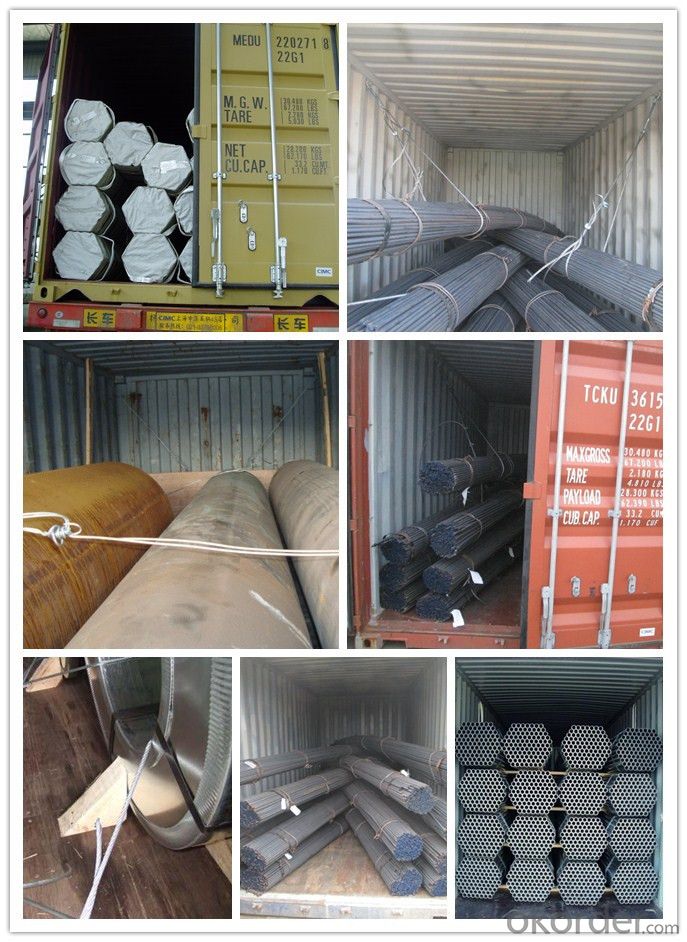
Round steel refers to the solid section for circular strip steel.Its specifications expressed as a number of mm in diameter, such as ""50"" indicates that the diameter of 50 mm round steel.Round steel hot rolling, forging and cold drawn three kinds.The specifications of the hot rolled round steel of 5.5 to 250 mm.5.5-25 mm small round steel are mostly with straight into bundles of supplies, commonly used for reinforcing steel bar, bolt, and various mechanical parts;More than 25 mm round steel,mainly used in the manufacture of mechanical parts and seamless steel tube billet.
Carbon steel according to the chemical composition (i.e., with carbon content) can be divided into low carbon steel, medium carbon steel and high carbon steel.According to the quality of the steel can be divided into ordinary carbon steel and high quality carbon steel.According to the purposes and can be divided into carbon structural steel, carbon tool steel.
The difference between the round steel and other steel: 1 appearance is not the same, round steel exterior circle of light, no lines without ribs, and other steel surface appearance has a groove or a rib, thus causing the cohesive force of small round steel and concrete, and the other the cohesive force of steel bar and reinforced concrete.2 ingredients are different, round steel (level 1) steel belong to the normal low carbon steel, more than other reinforcement for alloy steel.Three different intensity, low intensity of round steel and other steel high strength namely round steel have larger deformation before is pulled, and reinforced by other tensile deformation is much smaller.
- Q: What are the different types of steel round bar alloys for improved strength?
- Various steel round bar alloys are known for their enhanced strength. These alloys are developed by adding different elements to the steel composition, resulting in varying properties and strengths. Carbon steel is a commonly used alloy for increased strength. It contains a higher carbon content, which enhances its strength and hardness. Carbon steel round bars are widely utilized in applications that require high strength, such as construction, automotive, and machinery. Stainless steel is another alloy known for its corrosion resistance and high strength. Stainless steel round bars are frequently employed in environments where corrosion is a concern, such as marine applications, food processing, and chemical plants. Alloy steel is a different category that offers improved strength. It is created by incorporating elements like chromium, molybdenum, and nickel into the composition. Alloy steel round bars are commonly used in industries that necessitate high strength and durability, such as aerospace, oil and gas, and power generation. Tool steel is an additional alloy that provides enhanced strength and toughness. Tool steel round bars are specifically designed for machining and cutting applications, where high wear resistance and hardness are crucial. Lastly, there are specialty alloys such as nickel alloy and titanium alloy round bars, which offer exceptional strength and unique properties for specific applications. Nickel alloy round bars are often utilized in industries such as aerospace, chemical, and nuclear, while titanium alloy round bars are commonly found in aerospace, medical, and automotive industries. In conclusion, carbon steel, stainless steel, alloy steel, tool steel, and specialty alloys are the different types of steel round bar alloys that provide improved strength. Each of these alloys possesses its own unique properties and applications, offering a wide range of options for industries that require high strength materials.
- Q: What is the difference between a turned and a polished steel round bar?
- The surface finishes and properties of a turned steel round bar and a polished steel round bar are different as a result of separate processes they undergo. Typically, a turned steel round bar is created by removing material from the surface of a steel bar using a lathe machine. This process involves rotating the bar against a cutting tool, which cuts away the outer layer, leaving a smooth and cylindrical surface. Although the turned bar may have visible machining marks, it is generally known for its precise and uniform diameter compared to other types of steel bars. Turned bars are commonly used in applications where dimensional accuracy is crucial, such as in machinery or tooling. On the other hand, a polished steel round bar goes through a different process involving grinding or buffing the surface to achieve a smooth and reflective finish. Polishing eliminates any imperfections or roughness, resulting in a highly lustrous appearance. Polished bars are often utilized in decorative applications or where visual aesthetics play a significant role, such as in architectural designs or high-end consumer products. To summarize, the main distinction between a turned and a polished steel round bar lies in their manufacturing processes and resulting surface finishes. A turned bar is machined to achieve precise dimensions, while a polished bar undergoes a polishing process to obtain a smooth and reflective surface. The choice between the two depends on the specific requirements of the application, with turned bars being preferred for dimensional accuracy and polished bars for aesthetic appeal.
- Q: How are steel round bars stored?
- Steel round bars are typically stored in a vertical position, either stacked on racks or placed in specially designed shelves or racks. These storage methods ensure that the bars are well-supported and easily accessible for transportation and use. Additionally, steel round bars are often bundled or strapped together to prevent them from rolling or becoming disorganized.
- Q: What are the maximum allowable stresses for steel round bars?
- The maximum allowable stresses for steel round bars are influenced by various factors, including the grade of steel, the type of loading, and the design code being adhered to. Typically, the maximum allowable stress for steel round bars is determined by considering the yield strength of the steel. The yield strength signifies the stress at which permanent deformation or yielding of the material takes place. Distinct grades of steel possess different yield strengths. For instance, mild steel usually exhibits a yield strength of approximately 250 MPa, while high-strength low-alloy (HSLA) steel can have a yield strength reaching up to 550 MPa. To ascertain the maximum allowable stress, it is customary to apply a safety factor to the yield strength. This safety factor accounts for uncertainties in material properties, loadings, and potential variations in manufacturing processes. The specific safety factor employed can vary based on the application and the design code being followed. For instance, in structural steel design, the American Institute of Steel Construction (AISC) prescribes a safety factor of 1.67 for the yield strength. Thus, the maximum allowable stress would be the yield strength divided by 1.67. In order to determine the appropriate maximum allowable stresses for steel round bars in specific applications, it is crucial to refer to relevant design codes, standards, or engineering specifications.
- Q: Can steel round bars be used for pump shaft applications?
- Yes, steel round bars can be used for pump shaft applications. Steel round bars are commonly used for pump shafts due to their excellent strength, durability, and resistance to corrosion. Pump shafts are subjected to high torsional loads and need to withstand the stresses of rotating machinery. Steel round bars offer the necessary mechanical properties to handle these conditions, making them a suitable choice for pump shaft applications. Additionally, the versatility of steel allows for various heat treatments and surface finishes to further enhance its performance and longevity in pump shafts.
- Q: What are the different types of steel round bar coatings used in the automotive industry?
- In the automotive industry, various coatings are commonly applied to steel round bars to enhance their durability, corrosion resistance, and overall performance. Here are some examples: 1. Galvanized Coating: Widely utilized in automotive applications, this coating involves the application of a zinc layer to the steel bar's surface. Galvanized coating provides excellent protection against corrosion, safeguarding the steel from rust and other forms of degradation. 2. Epoxy Coating: This coating is preferred when high chemical resistance is required in automotive applications. It forms a protective barrier against chemicals, moisture, and other corrosive substances. Additionally, epoxy coatings exhibit exceptional adhesion properties, ensuring long-lasting performance. 3. Powder Coating: Known for durability and aesthetic appeal, powder coating is a popular choice for steel round bars in the automotive industry. It involves the application of dry powder to the steel bar's surface, which is then heated, creating a tough and protective layer. Powder coatings offer a wide range of colors and finishes, allowing for customization and branding opportunities. 4. Ceramic Coating: Ideal for automotive applications involving high temperatures, ceramic coatings provide exceptional heat resistance. They form a protective barrier that prevents heat damage and extends the lifespan of steel round bars. 5. Phosphate Coating: Often used as a pre-treatment before applying other coatings, phosphate coatings enhance adhesion and provide additional corrosion resistance. They also improve the lubricity of the steel bar, reducing friction and wear. These examples demonstrate the variety of steel round bar coatings used in the automotive industry. Each coating offers unique benefits and is selected based on specific application requirements. Ultimately, these coatings play a vital role in improving the performance and longevity of steel round bars in automotive applications.
- Q: What is the machinability of a steel round bar?
- The ease with which a steel round bar can be shaped, cut, and modified using machining processes determines its machinability. This property measures how easily the steel material can be worked on with tools like lathes, mills, drills, and cutting or shaping tools. Several factors influence the machinability of a steel round bar, including its chemical composition, microstructure, and any heat treatment it has undergone. Elements like sulfur, phosphorus, and lead can either enhance or hinder machinability, while alloying elements like chromium, molybdenum, and nickel can also have an impact. Steel round bars with high machinability are characterized by their ability to be easily cut, drilled, and shaped with minimal tool wear and power consumption. They also produce smooth, precise finishes with minimal surface defects. On the other hand, low machinability steel round bars are more challenging to work with and may require more power, specialized tools, and slower cutting speeds. Considering the machinability of a steel round bar is important when selecting materials for machining applications. Factors like desired cutting speed, tool life, surface finish, and overall machining efficiency should be taken into account. The specific machining operations, such as turning, milling, or drilling, will also influence the choice of steel round bar with suitable machinability. In conclusion, the machinability of a steel round bar is a crucial factor in determining its suitability for various machining processes. Understanding the machinability characteristics of different steel grades can help in selecting the most appropriate material for specific machining applications, ensuring efficient and effective machining operations.
- Q: What are the different machining processes used for steel round bars?
- There are several machining processes commonly used for steel round bars, depending on the desired outcome and specifications of the project. Some of the most common machining processes for steel round bars include: 1. Turning: Turning is a machining process where the round bar is rotated and a cutting tool is used to remove material, creating a desired shape or size. This process is commonly used to reduce the diameter of the round bar or to create precision cylindrical shapes. 2. Drilling: Drilling involves creating holes in the steel round bar using a rotating cutting tool called a drill bit. This process is often used to create holes for bolts, screws, or other fasteners. 3. Milling: Milling is a machining process that involves removing material from the surface of the steel round bar using a rotating cutting tool with multiple teeth. This process is used to create flat surfaces, grooves, or complex shapes on the round bar. 4. Grinding: Grinding is a process where abrasive particles are used to remove material from the steel round bar, creating a smooth surface finish or achieving specific tolerances. It is commonly used to refine the surface finish or to remove any imperfections. 5. Thread rolling: Thread rolling is a process used to create external threads on the steel round bar. A hardened steel die is pressed against the rotating round bar, causing the material to flow and form the desired threads. 6. Cold drawing: Cold drawing is a process where the steel round bar is pulled through a die to reduce its diameter and improve its surface finish. This process is used to create precise dimensions and improve the mechanical properties of the steel round bar. 7. Heat treatment: Heat treatment is not a machining process itself, but it is often used in conjunction with machining to enhance the properties of the steel round bar. Heat treatment processes such as annealing, quenching, and tempering can be used to improve hardness, strength, and toughness. These are just a few of the many machining processes that can be used for steel round bars. The specific process chosen will depend on factors such as the desired shape, size, surface finish, and mechanical properties required for the application.
- Q: Can steel round bars be used in automotive applications?
- Yes, steel round bars can be used in automotive applications. Steel round bars are commonly used in various automotive components and systems due to their strength, durability, and versatility. They can be used in the manufacturing of engine parts, suspension components, drive shafts, axles, and other structural parts of vehicles. Steel round bars offer excellent mechanical properties, including high tensile strength and good resistance to impact and fatigue, making them suitable for withstanding the demanding conditions experienced in automotive applications. Additionally, steel round bars can be easily machined, welded, and formed into the desired shape, allowing for efficient manufacturing processes in the automotive industry.
- Q: How do steel round bars perform under vibration or resonance?
- Steel round bars have excellent performance under vibration or resonance due to their high strength and stiffness. They are able to withstand and absorb vibrations, minimizing the risk of failure or damage. Additionally, steel round bars possess good damping properties, which helps in dissipating energy and reducing the amplitude of vibrations, resulting in improved stability and reduced noise levels.
Send your message to us
42CrNiMo4 Alloy Structural Steel Round Bars
- Loading Port:
- China main port
- Payment Terms:
- TT or LC
- Min Order Qty:
- 30 m.t.
- Supply Capability:
- 10000 m.t./month
OKorder Service Pledge
OKorder Financial Service
Similar products
Hot products
Hot Searches
Related keywords
